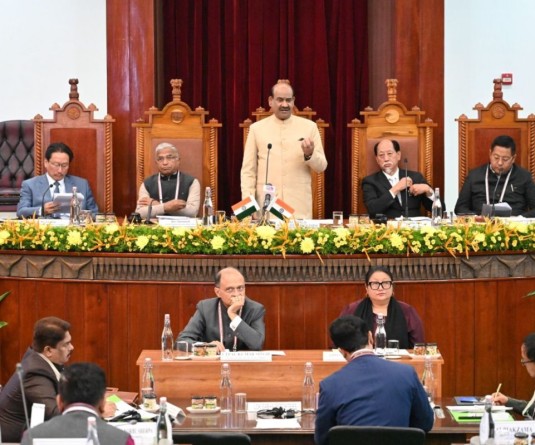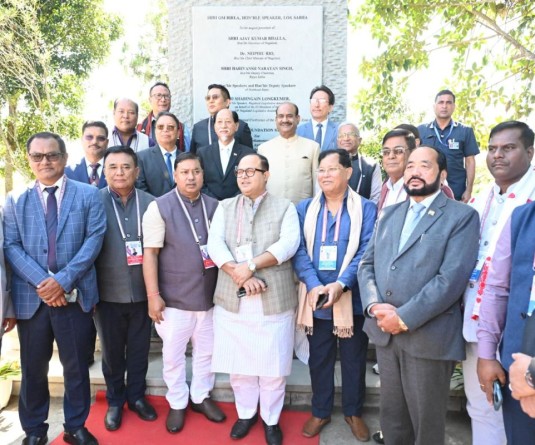
Battle against corruption and backdoor appointment far from over, says anti-corruption crusaders
Our correspondent
Kohima | July 26
The final hearing of the PIL filed by Public Service Aspirant Nagaland (PSAN) along with the Against Corruption And Unabated Taxation (ACAUT) last year against 706 backdoor appointments was held today at the Gauhati High Court, Kohima bench. The case which was presented before Justice Michael Zothankhuma lasted for over three hours with both parties presenting their arguments, however according to the PSAN and ACAUT, remained ‘inconclusive.’
The PSAN along with ACAUT had filed a Public Interest Litigation (PIL) on July 29, 2017 in the Gauhati high Court, Kohima bench against 655+51 backdoor appointments under 35 departments in Nagaland.
With the case remaining inconclusive, a press conference was held the same day at Ura Hotel Kohima where the ACAUT and PSAN reiterated their statement to continue to fight against backdoor appointment and corruption in Nagaland.
“We will not back off from our fight against backdoor appointment and the fight against corruption in Nagaland. What we have started in the last two-three years has been a tremendous journey for all of us. And even if the court does not rule in favour of us, we have taken the decision that we will not back off,” stated the ACAUT and PSAN members.
“The 706 posts were all appointed through illegal means. When such a huge numbers of posts -308 Class I gazetted posts, 176 Class II non-gazetted, 173 Class III non-gazetted-have been appointed through backdoor appointment, I don’t think it is proper on the part of the government or whoever the authority maybe to simply wash away this court order with the excuse of mere technical reason.
Regardless of the outcome of the judgement we will take up further course of action within the law of the land,” said PSAN member Ngukato K. Tsuipu adding, “The battle is far from over, maybe the beginning in fact to take the battle to the higher ground.”
The two groups had first filed RTIs and submitted representations to the government in the last three years, which was followed by ultimatums and then protests. “We took to the streets not just once but several times even up to the extent of sleeping in the streets in the winter of 2017. We have tried our best in whatever ways and means possible and we will continue until justice is delivered,” said Tsuipu.
Stressing on the vicious cycle of backdoor appointment which denies hardworking and meritorious students on their right to equal opportunities in government services, Tia Longchar, ACAUT expressed hope that the cycle will stop and that the judgement will be a positive one. “I believe that the court will pronounce its judgment on the hundreds and thousands of young Nagas whose faith in the judiciary tilts like a Damocles sword whether to believe in a system that will deliver justice or the judiciary that will also let us down,” remarked Longchar.
The ACAUT and PSAN were represented by Z. Zhimomi along with Zhevi, Asenla and Toshi.
Demand for setting up SSC
During the press conference, the PSAN also reiterated their demand to the government to set up the Staff Selection Commission (SSC) in Nagaland. Since last year, the group had met the three Chief Ministers of Nagaland to discuss on the setting up SSC with their last meeting held with the present Chief Minister of Nagaland, Neiphiu Rio.
With neighbouring states Assam and Arunachal Pradesh already having SSC in place, the PSAN viewed that setting up of SSC is important as the posts which does not come under the purview of NPSC, are being appointed through backdoor.
“Government officials and politicians are indulged in randomly appointing candidates in non-NPSC posts. Some of these posts reach the level of Secretary such as the LDA-cum-Computer Assistant post in Assembly Secretariat,” stated PSAN adding that if SSC is set up in Nagaland, it will cover the posts which do not come under the purview of NPSC.
According to the PSAN, requisitioning all the Class III posts to SSC will also save the time and energy of the government as well as the money of the applicants who have to spend a lot to apply for job recruitment exams.






